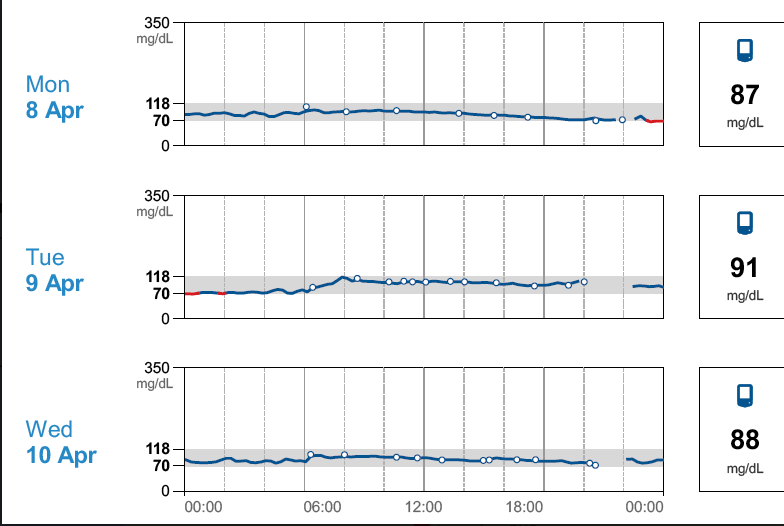Just for more info, I have years of this data. I know the numbers aren’t that accurate (I don’t trust these pin prick monitors at all), but in the time I’ve been tracking, there’s only been a single time when my blood sugar went down in response to exercise. And I think that was just the plus/minus 15% of the meter.
Back when I had a CGM, this is what it looked like:
What I noticed was higher overall blood sugar (as per the value on the right) any day that I exercised, and lower on days I did not. I have page after page of data (at home) that look like this.
@kib1 After exercise, I shower, take the dog out, crate the dog, drive to work. I then forget to take blood sugar. It’s also a complex calculation, because my blood sugar goes down all day from about 11 am. And eating a keto meal often causes my blood sugar zero rise or even a decrease. As you can see from the above, I ate sometime around 10 am, but there’s no way for you or me to know that just by looking at the curve. I know it because I get hungry a few hours after exercising and eat then. (Yes, I don’t eat anything for several hours after exercising.)
As for many of the other comments (was going to tag everyone, but I am at work and actually can only take a few minutes here), dawn effect definitely happens to me, but this goes beyond that. See here:
Tuesday 9 April is what I show separately above. Monday and Wednesday, I did not work out, and my overall blood sugar goes down those days.
It’s just now that I’m working out 5 days a week (probably only 3 days a week for those April graphs, which were years ago), and my blood sugar is higher all the time now. I’m imagining the curve from 9 April, but 5 days a week instead of 3. That only gives me 2 days/week of lower blood sugar. My HbA1c has crept up to 5.2 from 4.9.
I have more muscle mass than I did a few years ago, maybe that factors into it too?
I still fit into all my 34 pants and tried on an old suit. While I can fit into it, it’s tight, but that’s because of muscle mass. For instance, my thighs completely fill up the pants, and jacket is tight mainly at my chest.
So, I assume there’s some “feedback” mechanism telling my body to pump out more blood sugar, but I’d like to know why. Glycogen replacement? Red blood cells need more sugar? More important, is my Hb1c going to continue going up, and if so, why?
And I should note that on most of the days I do body weight training, I eat about 50g of carbs. (That’s now, not when those graphs above were taken.) I’d LOVE to have a CGM to compare what happens if I eat 50g of carbs one day after a workout and another day with no carbs after a workout. It’s possible to do this with a pin-prick meter, but my blood sugar goes up and down within an hour after eating. I’d need to take blood sugar every 15 minutes or so, which is quite painful.
I thought that if those carbs go to my muscles that morning and daily blood sugar would go down, but that doesn’t appear to be happening.





